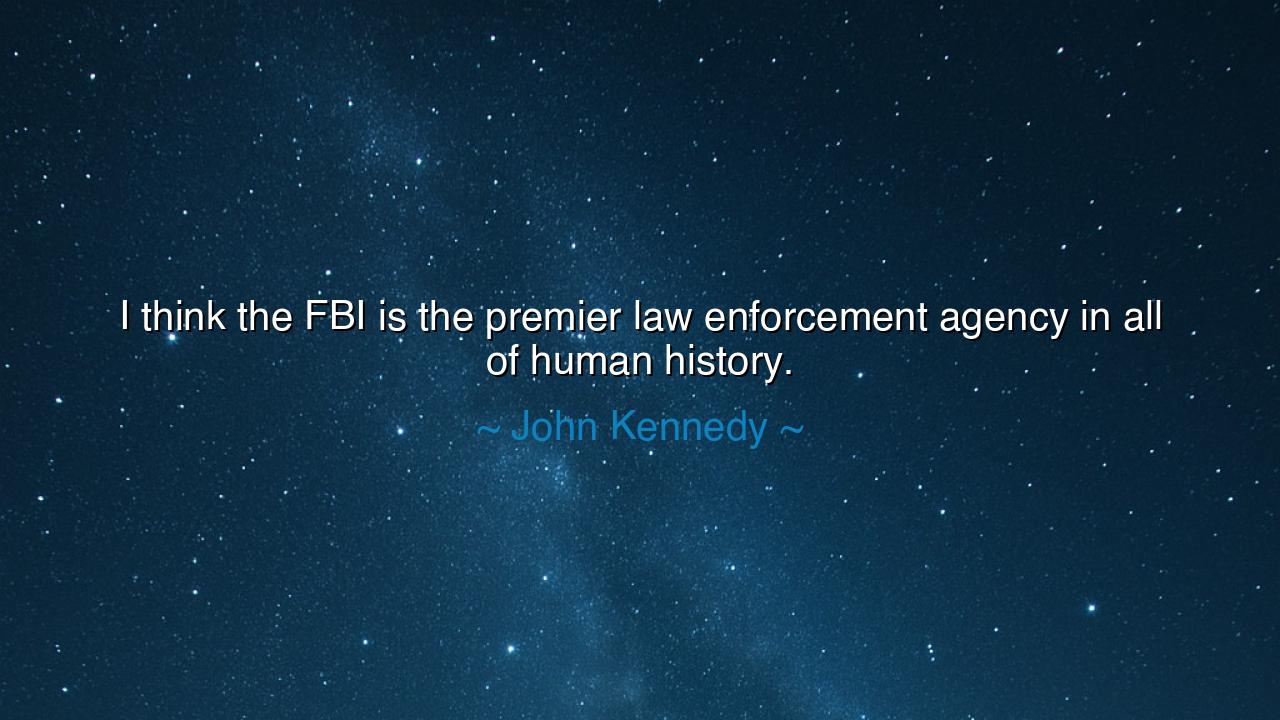
I think the FBI is the premier law enforcement agency in all of






The American president John F. Kennedy, a man whose words still stir the conscience of nations, once declared: “I think the FBI is the premier law enforcement agency in all of human history.” In this statement, he paid tribute not only to an institution, but to an ideal — the pursuit of justice, order, and truth in a world fraught with chaos and corruption. His words carry the tone of reverence and responsibility, for he understood that those who uphold the law are not merely guardians of society, but defenders of civilization itself. Through this quote, Kennedy sought to remind his nation that the strength of a people lies not only in arms or wealth, but in the integrity of their institutions and the courage of those who serve within them.
The origin of this statement lies in the early years of Kennedy’s presidency, during a time when America faced both internal strife and external peril. The Cold War loomed; spies and saboteurs crept through the shadows of nations; organized crime still lingered in the heart of the Republic. The Federal Bureau of Investigation, under its long and controversial director J. Edgar Hoover, stood at the forefront of this battle. It was more than a police agency — it was a symbol of vigilance in an age of uncertainty. When Kennedy praised the FBI as “the premier law enforcement agency in all of human history,” he was not merely lauding its power, but honoring the idea that in a free society, law must be the ultimate shield against disorder and tyranny.
To understand the deeper meaning of this quote, one must look beyond bureaucracy and see the moral architecture upon which the concept of justice rests. Throughout the ages, humanity has sought to bind its darker impulses with laws — from the Code of Hammurabi etched in stone to the Roman Twelve Tables, from the Magna Carta to the Constitution of the United States. Yet, laws alone are but lifeless words without those who enforce them with integrity. The FBI, in Kennedy’s view, represented the modern manifestation of that eternal struggle — the effort to balance freedom and order, to wield power not as a tool of oppression, but as a defense of the innocent. To praise it, then, was to affirm faith in humanity’s ongoing quest to civilize itself.
History offers many examples of this eternal tension between chaos and justice. In ancient Rome, the Praetorian Guard was formed to protect the empire’s leaders, but it soon fell prey to corruption, becoming an instrument of political ambition. In contrast, Kennedy saw in the FBI a chance to fulfill what those ancient guardians could not — an enduring institution built not upon loyalty to rulers, but to the rule of law itself. When agents of the Bureau dismantled criminal empires during the Prohibition era, or when they confronted espionage during the Cold War, they were continuing a sacred lineage of those who stand between society and anarchy. Kennedy’s words were a call to preserve this moral clarity, lest power without principle lead the nation astray.
Yet Kennedy, ever the idealist grounded in realism, knew that perfection is not the same as greatness. To call the FBI the “premier law enforcement agency in all of human history” was not to deny its flaws, but to recognize its ambition — to hold it to a standard as high as the ideals of the nation itself. He believed that greatness lies not in the absence of failure, but in the willingness to rise after error, to pursue truth even when it is difficult or dangerous. Just as America itself was an experiment in liberty, the FBI was an experiment in justice — proving that a republic’s strength must rest not in fear, but in fairness; not in secrecy, but in the steadfast pursuit of right.
The emotional power of Kennedy’s words also stems from his understanding of service and sacrifice. He had fought in war, had seen the frailty of peace, and knew that those who dedicate their lives to justice do so often in silence, without glory or reward. His praise of the FBI was also a tribute to the men and women who walk unarmed into the storm — who face criminals, conspirators, and traitors not for personal gain, but because they believe that law and truth must prevail. In every age, such souls are the invisible pillars of civilization. Without them, the walls of order would collapse into ruin.
Let this, then, be the lesson we take from Kennedy’s words: that the strength of a nation lies not in its might, but in its moral foundation. To honor those who enforce justice is to honor justice itself. Each generation must guard the integrity of its institutions, demanding that they serve truth and never tyranny. And each citizen, in their own way, must become an agent of that same ideal — living honestly, standing against corruption, and upholding what is right even when no one is watching.
For as Kennedy taught, the defense of justice is the highest form of patriotism, and to preserve it is to preserve the soul of a people. The FBI, in his eyes, was the vessel of that sacred duty — a reminder that while power may guard the borders of a nation, only law and truth can guard its spirit.






AAdministratorAdministrator
Welcome, honored guests. Please leave a comment, we will respond soon